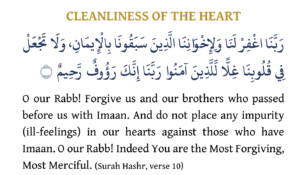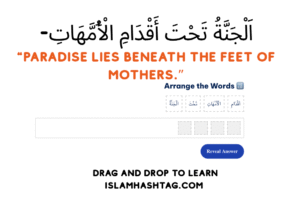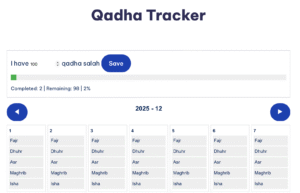Story of the Jewish Woman who Gifted a Poisoned Sheep to the Prophet, peace and blessing be upon him: It was narrated that Abu Hurairah, may Allaah be pleased with him, said:“When Khaibar was conquered, a roasted poisoned sheep was presented to the Prophet, peace and blessing be upon him, as a gift (by the Jews).The Prophet, peace and blessing be upon him, ordered, “Let all the Jews who have been here, be assembled before me.”The Jews were collected and the Prophet, peace and blessing be upon him, said (to them), “I am going to ask you a question. Will you tell the truth?”They said, “Yes.’The Prophet, peace and blessing be upon him, asked, “Who is your father?”They replied, “So-and-so.” He, peace and blessing be upon him, said, “You have told a lie; your father is so-and-so.” They said, “You are right.”He, peace and blessing be upon him, said, “Will you now tell me the truth, if I ask you about something?”They replied, “Yes, O Abul Qaasim; and if we should tell a lie, you can realize our lie as you have done regarding our father.”On that he, peace and blessing be upon him, asked, “Who are the people of the (Hell) Fire?” They said, “We shall remain in the (Hell) Fire for a short period, and after that you will replace us.”The Prophet, peace and blessing be upon him, said, “You may be cursed and humiliated in it! By Allaah, we shall never replace you in it.”Then he asked, “Will you now tell me the truth if I ask you a question?”They said, “Yes, O Abul Qaasim.” He, peace and blessing be upon him, asked, “Have you poisoned this sheep?”They said, “Yes.” He, peace and blessing be upon him, asked, “What made you do so?”They said, “We wanted to know if you were a liar in which case we would get rid of you, and if you are a prophet then the poison would not harm you.”
(1) Reported in Saheeh Al-Bukhaari No. (3169) and Saheeh Muslim (5835). (2) An-Nawawi; Sharh Saheeh Muslim (14/319) and Fat-h Al-Baari by Ibn Hajar (16/315) and ‘Umdatul Al-Qaari’ Sharh Saheeh Al-Bukhaair (22/373).
Lessons drawn from the above mentioned Hadeeth :
1- The Prophet, peace and blessing be upon him, accepted gift; however, did not accept charity nor was it permissible for him. That is because rulings of gift differ from that of charity. 2- It is permissible to take gift from the Jews and eat their slaughtered animals. 3- Allah The Almighty has revealed to His Messenger, peace and blessing be upon him, hidden and unseen matters.4- Stubbornness of the Jews i.e. although they acknowledged the truthfulness of the Prophet, peace and blessing be upon him, when he told them about the real name of their father and the poison they put in the sheep, they remain stubborn and went on denying his Prophethood. 5- The greatness of the character of the Prophet, peace and blessing be upon him, his great forbearing, patience, loving forgiveness and pardoning, where the Prophet, peace and blessing be upon him, did not take revenge for himself and did not punish the woman. 6- Allaah The Almighty has preserved His Religion and Prophet, peace and blessing be upon him. The secret of the Jews were revealed and their efforts were of no avail. The Prophet, peace and blessing be upon him, remained a life, led armies, conquered countries, offered Hajj, and gave sermons, admonishments, guidance and advices. The will of the enemies have never prevented the Will of Allaah The Almighty to come true. 7- Things such as, poisons and the like, have no effect with themselves. Bishr ibn Al-Baraa’, may Allaah be pleased with him, died from the poison while the Prophet, peace and blessing be upon him, used to feel ill from that sheep but did not die from it; rather, he lived many years after eating from it. 8- Scholars held different opinions regarding what the Prophet, peace and blessing be upon him, did with that Jewish woman. Some viewed that he, peace and blessing be upon him, pardoned her. Some others said that he, peace and blessing be upon him, executed her. Scholars said: “To reconcile these reports and opinions, he, peace and blessing be upon him, did not execute her when Allaah The Almighty informed him with what she did and protected him from her evil. It was said to him: “Execute her.” He, peace and blessing be upon him, said: “No.” However, when Bishr ibn Al-Baraa’ died from it, he gave her to his relatives and they executed her as a Qisaas (i.e. equitable retribution) for him (i.e. Bishr ibn Al-Baraa’). Accordingly, the opinion that sees that he, peace and blessing be upon him, did not execute her immediately is correct and the other opinion that sees that he, peace and blessing be upon him, executed her afterwards is correct. Allaah Knows best.(1) Reported in Saheeh Al-Bukhaari No. (3169) and Saheeh Muslim (5835). (2) An-Nawawi; Sharh Saheeh Muslim (14/319) and Fat-h Al-Baari by Ibn Hajar (16/315) and ‘Umdatul Al-Qaari’ Sharh Saheeh Al-Bukhaair (22/373).
My non-Tech Mom loves this Digital Tasbih because her counts are never lost. Alhumdulillah, Now she spends close to Four hours in dhikr everyday. Would you like to build your dhikr habit too?
It’s completely free.
Discover more from Islam Hashtag
Subscribe to get the latest posts sent to your email.






In Charity you intend to seek blessing of Allah and intend Thawab as well. It can be obligatory like Zakah, and non obligatory like just giving to poor as their right in our earnings. But the Gift is just to give with out Thawab intention. It is just to please your brother or sister or to strong your relation.
To reconcile, one need to be kind and be sorry if you have done wrong with them. Tell them the truth that you all are human and do mistakes and the best one is who repent and be sorry. Make simple dua for them to be united and be around you. Make alot dua for them and it will work.
How to reconcile brothers n sisters cousins aunts uncles father mothers family affairs what dua to read
Thank you for this wonderful information looking forward for more. I really appreciate your efforts to write such amazing piece of content for us.
very informative website on islam .
i read every article of this website.
Assalamu aleikum. wasalatu wasalm ala rasulillahi. salallahu aleihi wasalam.. pls i need more clarification on the difference between Charity and Gif. What are their various criterias. Thank you